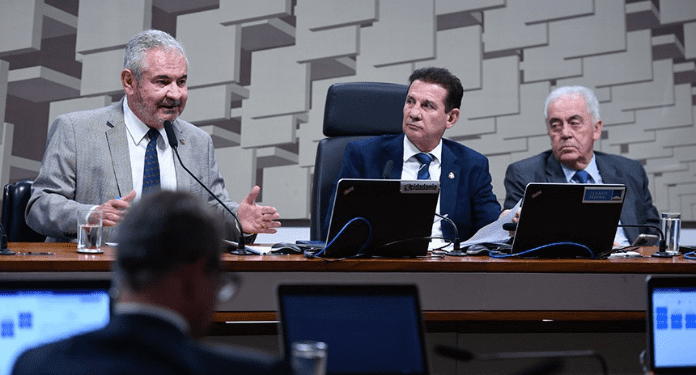The Senate Economic Affairs Committee, on Tuesday, 21, postponed the vote on Bill 3,626/2023, which proposes the regulation of fixed-odd sports betting, popularly known as “bets”.
This decision, scheduled for this Wednesday, follows a request for a review from senator Eduardo Girão (Novo-CE).
According to Girão, this “is an extremely serious issue, which impacts less privileged people. We need to be very careful when legislating.”
Resource distribution and social impact
The project, supported by the report of Senator Angelo Coronel (PSD-BA), not only regulates an expanding sector, but also outlines the allocation of the resources generated.
While an amendment proposes that the lottery operator receives 88% of the proceeds, with the remaining 12% being divided between sport, tourism, security, education and health.
This distribution reflects a commitment to social well-being and fiscal responsibility.
Precautions and details of the betting regulation project
PL 3,626/2023 covers a variety of bets, from real sporting events to virtual games, and includes physical and online modalities.
The project incorporates significant preventive measures, such as the prohibition of betting in youth categories and for minors, in addition to actions against gambling disorder.
Angelo Coronel argues: “The fixed-odd betting market has grown rapidly… For the sports betting market to function properly, it needs to be regulated.”
“The project precisely fills this gap in Brazilian legislation and puts the country at the forefront of regulating this new economic activity, with clear rules for its authorization and the identification of providers, the volume of bets, supervision and several other relevant aspects, in addition to to enable tax collection”, he added.
Betting regulation and authorization to operate in Brazil
PL 3,626/2023 requires authorization from the Ministry of Finance for the company that operates the fixed odds betting system. The authorization is valid for five years, but can be reviewed at any time, ensuring the adversarial process and full defense of the interested party.
Only legal entities that meet certain requirements can be authorized, such as:
- be constituted in accordance with Brazilian legislation, with headquarters and administration in the national territory, and comply with the regulations of the Ministry of Finance;
- have at least one of the members of the control group with proven knowledge and experience in games, betting or lotteries;
- have technical and cybersecurity requirements to be observed in their systems and information technology;
- adopt internal control procedures, such as customer service for bettors and ombudsman services; It is
- have a policy to prevent money laundering, terrorist financing, the proliferation of weapons of mass destruction, pathological gambling disorders and match-fixing and other frauds.
Amendment
However, an amendment suggested by the rapporteur included a new criterion for the company’s qualification: having a Brazilian as a partner holding at least 20% of the share capital.
“The regulation of the fixed-odd betting market also needs to be an opportunity to create jobs and encourage the participation of Brazilian companies. In this sense, we offer an amendment to guarantee the participation of Brazilian shareholders in the composition of companies operating in the sector”, he argued.
Furthermore, the controlling partner or shareholder cannot hold direct or indirect participation in a football corporation or professional sports organization.
Therefore, he is also prevented from acting as a manager of a Brazilian sports team or of financial institutions that process sports bets.
The administrative authorization procedure must be processed electronically. During the analysis, access to the process is restricted to the interested party and the representative.
Authorization, therefore, is only issued if, after examining the documentation, the Ministry of Finance concludes about the company’s technical and financial capacity and the reputation and knowledge of controllers and administrators. Finally, companies must pay a consideration limited to R$30 million.
Therefore, the expectation is that the committee will approve the bill today, and it will be forwarded to the Senate Plenary for consideration.




















































